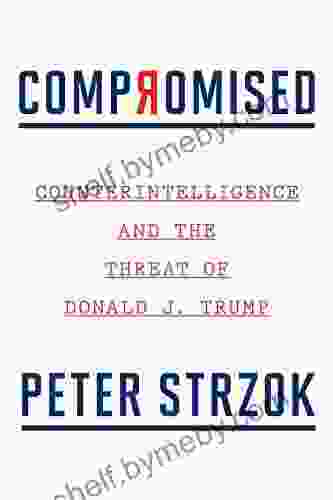Counterintelligence and the Threat of Donald Trump: Unmasking the Hidden Danger

4.7 out of 5
| Language | : | English |
| File size | : | 1249 KB |
| Text-to-Speech | : | Enabled |
| Screen Reader | : | Supported |
| Enhanced typesetting | : | Enabled |
| Word Wise | : | Enabled |
| Print length | : | 387 pages |
| X-Ray | : | Enabled |
| X-Ray for textbooks | : | Enabled |
The presidency of Donald Trump has been one of the most consequential in American history. His unorthodox behavior, inflammatory rhetoric, and close ties to foreign powers have raised serious concerns among counterintelligence experts.
Counterintelligence is the practice of protecting a country from espionage, sabotage, and other threats to national security. It involves gathering intelligence on potential threats, identifying vulnerabilities, and taking steps to mitigate risks.
During Trump's presidency, there were numerous instances of suspicious behavior that raised red flags for counterintelligence officials. For example, Trump's repeated contacts with Russian officials, his willingness to share classified information with foreign leaders, and his attempts to obstruct justice in the Mueller investigation all suggested that he may have been compromised by a foreign power.
In addition to his own behavior, Trump also surrounded himself with individuals who had questionable ties to foreign governments. For example, his former campaign chairman, Paul Manafort, was convicted of financial crimes related to his work for pro-Russian Ukrainian politicians. His former national security adviser, Michael Flynn, pleaded guilty to lying to the FBI about his contacts with Russian officials.
The combination of Trump's own behavior and the questionable characters he associated with created a serious counterintelligence threat to the United States. Counterintelligence officials were concerned that Trump could be manipulated or blackmailed by foreign powers, which could have compromised national security.
The full extent of the counterintelligence threat posed by Donald Trump may never be known. However, the evidence suggests that he was a serious risk to national security. His presidency was a wake-up call for the intelligence community, and it is essential that steps be taken to prevent a similar threat from emerging in the future.
Intelligence Failures
One of the most troubling aspects of the Trump presidency was the intelligence community's failure to adequately assess the counterintelligence threat he posed. This failure was due to a number of factors, including:
- Underestimation of the threat: The intelligence community did not fully appreciate the potential for a foreign power to compromise a president of the United States. They underestimated the risks of Trump's contacts with Russian officials and his willingness to share classified information with foreign leaders.
- Political interference: The Trump administration repeatedly interfered with the intelligence community's investigations into Russian interference in the 2016 election. This interference made it difficult for the intelligence community to conduct a thorough and objective investigation.
- Lack of resources: The intelligence community was understaffed and underfunded during the Trump administration. This made it difficult for the intelligence community to keep up with the rapidly evolving threats posed by foreign powers.
The intelligence community's failure to adequately assess the counterintelligence threat posed by Donald Trump was a serious intelligence failure. This failure had a number of consequences, including:
- It allowed Trump to continue to pose a threat to national security: The intelligence community's failure to identify and mitigate the threat posed by Trump allowed him to continue to engage in behavior that could have compromised national security.
- It damaged the credibility of the intelligence community: The intelligence community's failure to adequately assess the threat posed by Trump damaged its credibility. This damage will make it more difficult for the intelligence community to effectively protect the United States from future threats.
- It undermined public trust in government: The intelligence community's failure to adequately assess the threat posed by Trump undermined public trust in government. This damage will make it more difficult for the government to effectively address future threats.
Foreign Influence
There is ample evidence that Donald Trump was influenced by foreign powers during his presidency. This influence was manifested in a number of ways, including:
- Personal relationships: Trump had a number of personal relationships with foreign leaders, including Russian President Vladimir Putin and North Korean dictator Kim Jong-un. These relationships gave these leaders direct access to Trump and allowed them to influence his decisions.
- Business interests: Trump had a number of business interests in foreign countries, including Russia and China. These business interests gave foreign governments leverage over Trump and allowed them to influence his decisions.
- Financial entanglements: Trump had a number of financial entanglements with foreign governments and individuals. These entanglements gave foreign governments leverage over Trump and allowed them to influence his decisions.
The influence of foreign powers on Donald Trump was a serious threat to national security. This influence allowed foreign governments to shape U.S. policy and to advance their own interests. It also undermined the integrity of the U.S. government and made it more difficult for the United States to effectively address threats to national security.
Potential National Security Risks
The combination of Trump's own behavior, the questionable characters he associated with, and the influence of foreign powers created a number of potential national security risks, including:
- Compromise of classified information: Trump's willingness to share classified information with foreign leaders created a risk that this information could be compromised and used against the United States.
- Blackmail: Trump's financial entanglements with foreign governments and individuals created a risk that he could be blackmailed into acting against the interests of the United States.
- Foreign interference in U.S. elections: Trump's willingness to accept foreign assistance in the 2016 election created a risk that foreign powers could interfere in future U.S. elections.
- Damage to U.S. alliances: Trump's attacks on U.S. allies and his willingness to withdraw from international agreements damaged U.S. alliances and made it more difficult for the United States to effectively address threats to national security.
The potential national security risks posed by Donald Trump were significant. These risks could have had a devastating impact on the United States and its allies.
The presidency of Donald Trump was a wake-up call for the intelligence community. The intelligence community's failure to adequately assess the counterintelligence threat posed by Trump was a serious intelligence failure that had a number of consequences. The influence of foreign powers on Trump was a serious threat to national security that allowed foreign governments to shape U.S. policy and to advance their own interests. The potential national security risks posed by Trump were significant and could have had a devastating impact on the United States and its allies.
It is essential that steps be taken to prevent a similar threat from emerging in the future. The intelligence community must be strengthened and provided with the resources it needs to effectively assess threats to national security. The government must also take steps to reduce the influence of foreign powers on U.S. policy and to protect the integrity of the U.S. government.
4.7 out of 5
| Language | : | English |
| File size | : | 1249 KB |
| Text-to-Speech | : | Enabled |
| Screen Reader | : | Supported |
| Enhanced typesetting | : | Enabled |
| Word Wise | : | Enabled |
| Print length | : | 387 pages |
| X-Ray | : | Enabled |
| X-Ray for textbooks | : | Enabled |
Do you want to contribute by writing guest posts on this blog?
Please contact us and send us a resume of previous articles that you have written.
 Book
Book Novel
Novel Page
Page Chapter
Chapter Text
Text Story
Story Genre
Genre Reader
Reader Library
Library Paperback
Paperback E-book
E-book Magazine
Magazine Newspaper
Newspaper Paragraph
Paragraph Sentence
Sentence Bookmark
Bookmark Shelf
Shelf Glossary
Glossary Bibliography
Bibliography Foreword
Foreword Preface
Preface Synopsis
Synopsis Annotation
Annotation Footnote
Footnote Manuscript
Manuscript Scroll
Scroll Codex
Codex Tome
Tome Bestseller
Bestseller Classics
Classics Library card
Library card Narrative
Narrative Biography
Biography Autobiography
Autobiography Memoir
Memoir Reference
Reference Encyclopedia
Encyclopedia Diana Marcum
Diana Marcum Susanne Foitzik
Susanne Foitzik Howtodressage
Howtodressage June Wood
June Wood Heather Allen
Heather Allen Hope Hatton
Hope Hatton Hirofumi Neda
Hirofumi Neda Idan Ravin
Idan Ravin Vartan Gregorian
Vartan Gregorian Iain Pardoe
Iain Pardoe Mayo Clinic
Mayo Clinic Scaachi Koul
Scaachi Koul Heinz Peter Wagner
Heinz Peter Wagner Hayao Miyazaki
Hayao Miyazaki Krishna Dharma
Krishna Dharma Will Bardenwerper
Will Bardenwerper Tadashi Ono
Tadashi Ono Jesse Bryant Wilder
Jesse Bryant Wilder Howard Sherman
Howard Sherman Ian Ross Robertson
Ian Ross Robertson
Light bulbAdvertise smarter! Our strategic ad space ensures maximum exposure. Reserve your spot today!

 Nathaniel PowellSimple Ways to Help You and Your Family Feel Calm, Connected, and Content
Nathaniel PowellSimple Ways to Help You and Your Family Feel Calm, Connected, and Content
 Edwin BlairDiscover Your Cosmic Destiny: Explore the Wonders of Astrology with the Kid's...
Edwin BlairDiscover Your Cosmic Destiny: Explore the Wonders of Astrology with the Kid's...
 Dustin RichardsonHow to Bring Happiness and Meaning to Your Retirement: The Essential Guide...
Dustin RichardsonHow to Bring Happiness and Meaning to Your Retirement: The Essential Guide... José MartíFollow ·12.1k
José MartíFollow ·12.1k Ivan CoxFollow ·13.3k
Ivan CoxFollow ·13.3k Frank ButlerFollow ·18.1k
Frank ButlerFollow ·18.1k Nick TurnerFollow ·10.4k
Nick TurnerFollow ·10.4k Clark BellFollow ·16k
Clark BellFollow ·16k Doug PriceFollow ·7.8k
Doug PriceFollow ·7.8k Carl WalkerFollow ·17.2k
Carl WalkerFollow ·17.2k Charles ReedFollow ·15.2k
Charles ReedFollow ·15.2k

 Bo Cox
Bo CoxUncover the Enchanting Pearl of the Arabian Gulf: Insight...
Escape to the opulent...

 Michael Crichton
Michael CrichtonInsight Guides Pocket Baku Travel Guide Ebook: Your...
An Enchanting Journey...

 Eugene Scott
Eugene ScottLearn to Paint Scenic Scenes: Unveil the Secrets of...
Step into the...

 Benji Powell
Benji PowellEmbark on a Culinary Adventure with "The Ultimate Sichuan...
Sichuan cuisine,...

 Finn Cox
Finn CoxDiscover the Enchanting World of Art Nouveau: A...
Immerse yourself in the captivating beauty...

 Corey Green
Corey GreenUncover the Vibrant World of Guatemalan Chicken Buses: An...
Step into a world of vibrant colors,...
4.7 out of 5
| Language | : | English |
| File size | : | 1249 KB |
| Text-to-Speech | : | Enabled |
| Screen Reader | : | Supported |
| Enhanced typesetting | : | Enabled |
| Word Wise | : | Enabled |
| Print length | : | 387 pages |
| X-Ray | : | Enabled |
| X-Ray for textbooks | : | Enabled |






